2017 witnessed the growth of China’s digital communication backed with netizen-favored sticker set.
The Baidu Baike, China’s Wikipedia equivalent, revealed a list of the Top 10 Trendy Internet Slang Words and Phrases of 2017.
12 days ahead of 2018, Baidu released the 2017 Chinese Online Search List and 180 Hot Online Searches, a good way to look back on what happened on the Internet this year – to share joys and laughter, and some of the most unforgettable moments with readers.
The list is based on the annual data of Baidu’s most commonly searched words over the year by Chinese netizens and most of the popular phrases have been turned into stickers favored by Chinese netizens.
Let’s take a look at the year’s hottest online phrases and words:
Do you Freestyle?
The most popular Chinese Internet phrase is ”Do you freestyle?” “Do you freestyle?” comes from the hit reality TV show The Rap of China. The phrase has been repeatedly used by Chinese pop idol Kris Wu, a Chinese singer, actor and judge on the show when it comes to picking a winner. “Do you freestyle?” has soon become an immensely popular phrase on the Chinese Internet.
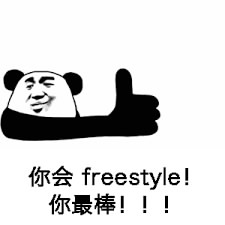
The sticker translates to "You are the best if you can freestyle." / Photo via Sina Weibo
The sticker translates to "You are the best if you can freestyle." / Photo via Sina Weibo
The result was a heavy flow of memes where Chinese netizens ridiculed Wu's credentials as a rap artist, asking each other for their freestyle proof in various permutations. Instead of talking about dreams and ambitions, it is a popular trend of talking about freestyle among Chinese millennials.
For example: You said you knew a lot of things, but can you freestyle?
dǎ call – Beat a call
The phrase “beat a call” refers to the obsessive dance of “otaku,” or people obsessed with pop culture. Originated from a Japanese word, Chinese netizens use it to show their approval and support for people or things they admire.
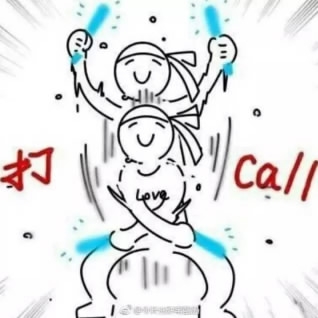
The phrase reads as " beat a call." /Photo via sohu.com
The phrase reads as " beat a call." /Photo via sohu.com
Some Chinese media outlets have already applied the word to their daily newsfeed, making the word slowly become a common language in China.
For example: EXO is my favorite K-pop band, I’d dǎ call for them.
Diss – Disrespect or disparage
“Diss” has been given the third place.The phrase is short for disrespect or disparage, has gradually become popular among Chinese netizens since the show The Rap of China has been launched. Diss Songs indicate those that primarily intended to disrespect a person or group. While musical parodies and attacks are nothing new, the trend has become growingly common in the Hip-Hop genre caused by the Hip-Hop rivalry phenomenon.
For example: Traveling around with her parents’ money and showing off - I diss her kind.
pípí xiā, wǒmen zǒu! – Let’s go, Mantis Shrimp!
As one of the most popular Internet meme in China across the year, "Let's go, Mantis shrimp!" is not only a network emoji but also has become the subject of a popular song.
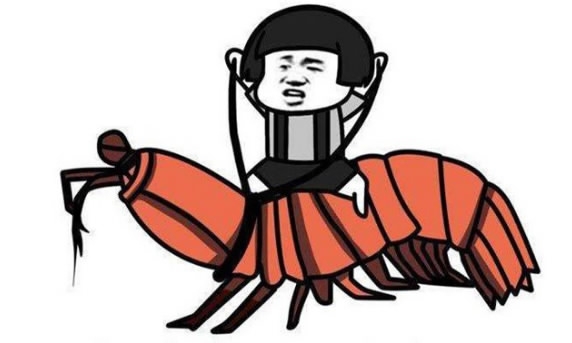
The popular "Let's go, Mantis Shrimp" sticker. /Photo via sina.com
The popular "Let's go, Mantis Shrimp" sticker. /Photo via sina.com
"Let's go, Mantis shrimp!” refers to various Internet images of a little person riding on the back of a mantis shrimp. The rider is always featured with a bad smile for added humor. The meme originated from an online card game – Yu-Gi-Oh!
For example: “I didn’t mean to deceive you.” “It’s too late. pípí xiā, wǒmen zǒu!"
qíu chuí dé chuí – Ask and ye(you) shall your receive
This phrase refers to the process that the people who spilled the beans first and then came out with the proof after it was required. But more meanings have derived from the original phrase and it can be understood as “Ask and ye (you) shall your receive” or “You shall get what you want every time you ask for it.”
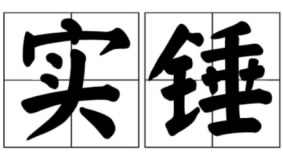
The phrase translates to " hard evidence." /Photo via baike.com
The phrase translates to " hard evidence." /Photo via baike.com
“Chui,” literally means "hammer" in Chinese, used to express hard evidence.
For example: A recently released source made netizens qíu chuí dé chuí about this superstar’s rumor.
zhā xīn le, lǎo tiě – That makes my heart broken, my friend
The origin of the phrase, which literally translates to “prick to my heart,” reportedly originates from a live stream outlet DouYu TV where a child from Northeast Aroused widespread concern frequently showing up in the bullet comments.
“Laotie,” literally means "old steel" in Chinese, refers to “good buddies” in the northern Chinese dialect, “heart broken” means to convey deep-seated sadness. The phrase has been adopted by netizens to satirically vent dissatisfaction with close friends online. Laotie has soon been used alone nationwide to indicate good friend.
For example, “My dad has got me a lot of presents for the New Year,” said Joe. “I’ve got nothing. zhā xīn le, lǎo tiě,” said Chen.
lū qǐ xiù zi, jiā yóu gàn – Roll up our sleeves and work with added energy
A phrase used by Chinese President Xi Jinping in his
New Year speech and then has been widely used by Chinese netizens as a warm response to the call.
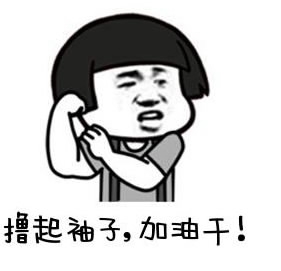
The sticker translates to "Roll up our sleeves and work with added energy." /Photo via Weibo
The sticker translates to "Roll up our sleeves and work with added energy." /Photo via Weibo
For example: lū qǐ xiù zi, jiā yóu gàn, let's pull another all-nighter.
bǐ xīn – Finger Heart Sign
Bi Xin, form a heart shape by fingers, derives from Korean pop idols as a way to express their love for fans and soon be adopted by Chinese netizens to show their love or support to their friends or families.
For example: It's so nice of you getting me a New Year present. I bǐ xīn to you.
gà liáo – awkward chat or embarrassing conversation
The term “awkward chat” or “embarrassing conversation” refers to having an inevitable conversation with people who lack good communication skills.
For example: I had a horrible night with the guy. We have been Gà Liáo for the whole night, and all I wanted was just escape from him.
dà jí dà lì, wǎn shàng chī jī – winner, winner, chicken dinner
The phrase got the public wide attention from the immensely popular PlayerUnknown's Battlegrounds video game, completing the list.
Chi ji, or eating chicken, has good meaning as da ji da li in Chinese as good fortune. It frequently appeared after one won in a video game competition soon became popular when referring to wish one good luck. The phrase was reportedly derived from the American heist drama film 21.
For example: “I’m gonna bet for Powerball for one more time.” “ dà jí dà lì, wǎn shàng chī jī.”










